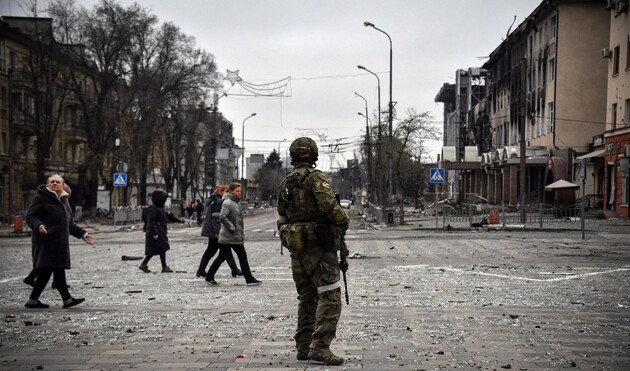On the intragroup struggle of the "liberators"
The situation in the temporarily occupied territories
The Kremlin's current strategy for the temporary administration of the newly occupied territories can be described in three words — propaganda, repressions and split-up.
It seems that the Kremlin does not see any quick prospects to legalize the occupation of Ukrainian territories. It is unclear what to do with all the self-appointed so-called military-civil administrations. The State Duma is already preparing a legal framework for their replacement in the form of "temporary administrations" to be composed personally by Putin. It is planned that these "temporary executive bodies" will be engaged in the socio-economic development of the invaded territories and the protection of citizens of the Russian Federation.
The initiative recently announced by the Kremlin on the simplified issuance of russian passports to residents of southern regions of Ukraine is designed to address the problem of the absence of "citizens" in the occupied territories who purportedly need to be protected. The cynicism of these conversations about the "protection of one's own" is that the forcible issuance of passports of the aggressor's country will primarily serve the purpose of turning Ukrainian citizens into people bound to military service for the russian federation. They will announce the general mobilization and include the scenario tested in the temporary occupied territories of Donetsk and Luhansk regions: you go out to buy some bread and end up in the trenches.
All of these people with russian passports (and we cannot yet know the share of the population who will swallow the bait on their own will) are viewed by the Kremlin not only as "cannon fodder" but also as submissive voters. But we know for a fact that Putin's move is a cynical jesuitism towards people surrounded by tanks who are "offered" a russian passport. Today, overt daredevils are few. Especially when you have to survive and feed your family. Even if you came out to the anti-russian rally at the start of the occupation. In the near future, the picture will become clear. Therefore, the "liberators" are not in a hurry yet.
Signs of preparation for the pseudo-referendum can be seen only in the fact that the neutralization and expulsion of the undesirables continue, and the preparatory measures are in place for brainwashing of those who remained. New hosts and the old-timers from the temporarily occupied territories feel better than others that the window of opportunity for the split-up can close quickly — you need to rush to manage to steal everything.
Experiments in Southern Regions of Ukraine
In Kherson, Mykolaiv, and Zaporizhzhia Oblasts, the governance in the occupied territories is based on a chaotic conglomerate of so-called military-civil administrations that are located in the largest Ukrainian cities invaded by the rf troops (Kherson, Melitopol, Energodar, Berdyansk). The collective portrait of all these "ceremonial bystanders" from the occupation administrations demonstrates the failed personnel policy of the Kremlin in the newly occupied lands.
The model of "people's mayors" or "governors", already tested in 2014, did not work, simply because there were no reputable or high-status candidates in a narrow cohort of local collaborators. The Kremlin did not dare to delegate direct puppets because the occupation has never been formally recognized. That is why the only way out was to recruit marginal characters and political outsiders.
Thus, a local entrepreneur became a pseudo-mayor of Berdyansk, and he appointed a yardkeeper of a local municipal enterprise as his deputy mayor. The person appointed in charge on behalf of the occupiers in Mykolaiv Oblast was a councilor from the "Opposition Block" who was written off by the Kremlin and entered into the sanctions list in 2018. His assistant, for her loyalty, received the illegal status of the mayor of Melitopol. The chief anti-vaccinator and conspiracy fan from Kherson Oblast became the deputy head of the occupation administration of the Oblast; and in Kherson, the driver of the head of the Oblast occupation administration was appointed as a pseudo-mayor.
Obviously, russian curators, who usually supervise all these figures, consider them as consumables for the needs of temporary management. From the Ukrainian perspective, they face criminal liability with the qualification of "treason" and/or "collaboration with the enemy". The choice is narrow.
The initial plan to replicate the Crimean scenario of occupation was hampered by the clear position of local councilors, specifically in Oblast councils. Because they refused to cooperate, the occupiers failed to demonstrate any symbolic succession of power. Realizing that it is not possible to legalize pseudo CMAs on Ukrainian territories, they have recently submitted to the State Duma a draft law on temporary administrations outside the Russian Federation.
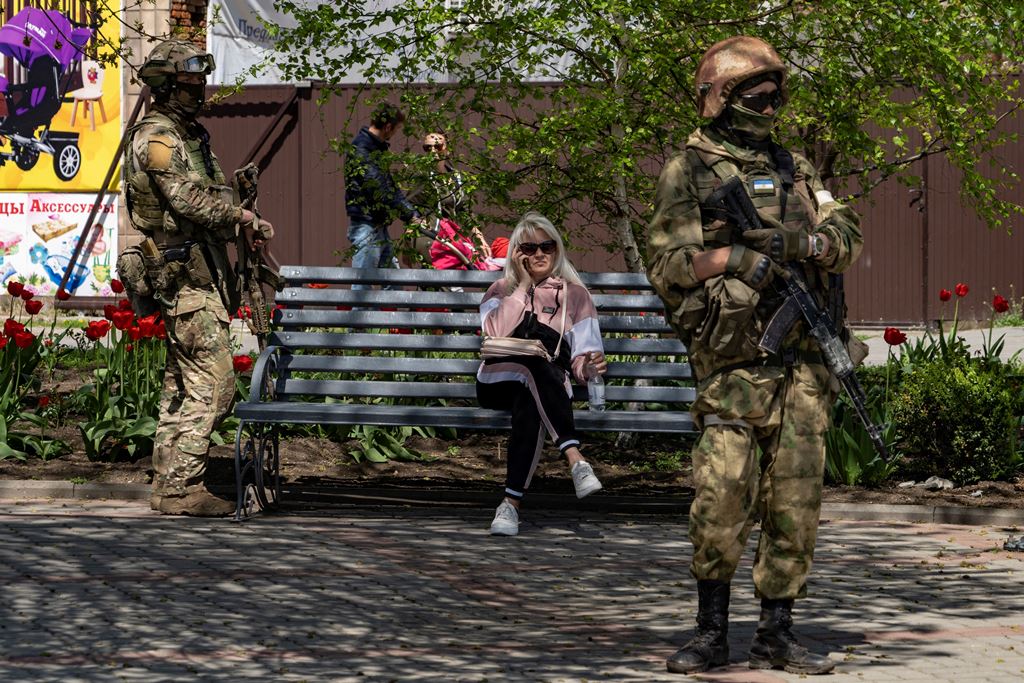
The russians are patrolling the street in Berdyansk, April 30, 2022. Getty Images
They propose to lower the vertical of the central executive power directly to the occupied cities. In fact, the Kremlin accepted that there is no point in denying the occupation. Yesterday, Putin gave an order to forcibly issue passports of the aggressor country in Kherson and Zaporizhia Oblasts. He is accumulating the negotiation resources. The expectation is that citizens with Russian passports will stay as a Trojan horse if the occupying personnel suddenly have to evacuate quickly. Then "lines of argumentation" about the need to protect and guarantee security for "their own" citizens will be brought up to the negotiating table.
Since the plan with collaborators did not work, the ultimate goal of this stage of Russian occupation remains uncertain for the Kremlin. Ideas about the inclusion of captured territories in the Russian Federation are promoted very carefully. Peskov or Slutskyi are hinting at a referendum but even the so-called deputy head of the illegal administration of the Kherson region, Stremousov, admitted that public opinion was not ready for this and that it would be difficult to change anything by the end of the year. There are fears that a pseudo-referendum, even at gunpoint, could turn into a laughing stock and another failure. But the preparation of the voters for fictitious expressions of will is underway.
Since it turned out that the people were not ready to positively accept the occupation, the main effort of illegal administrations focused on shaping public opinion. The hierarchy of priorities is dominated by symbolic politics: the occupiers change names, statuses, signatures, signs, and the settings. Russian television instead of Ukrainian, Russian spoken instead of Ukrainian, rouble instead of hryvnia. In Melitopol, shops and businesses do not work properly, the provision of urban amenities has collapsed, there are no medicines in pharmacies. Meanwhile, the "Immortal Regiment" is walking down the streets of the city, and an exhibition about the creation of the Taurida province was opened in the local history museum.
Destruction of life support infrastructure (electricity, gas, water supply, sewerage networks) during the expansion of the captured territories of the Russian Federation is not a side effect of hostilities. This is done in order to incline the population to forced evacuation and create conditions for the advance of occupying staff. Within the framework of the recently announced Kremlin idea of patronage of Russian regions over the occupied Ukrainian cities and regions, an influx of "friendly specialists and curators" is expected in the near future. Before propaganda starts bearing fruit, the disloyal population will remain a direct obstacle to the establishment of control by the Russian Federation over the newly captured territories. Thus, along with the symbolic policy, they exercise repressions — they kidnap citizens and run filtration measures against patriotic residents.
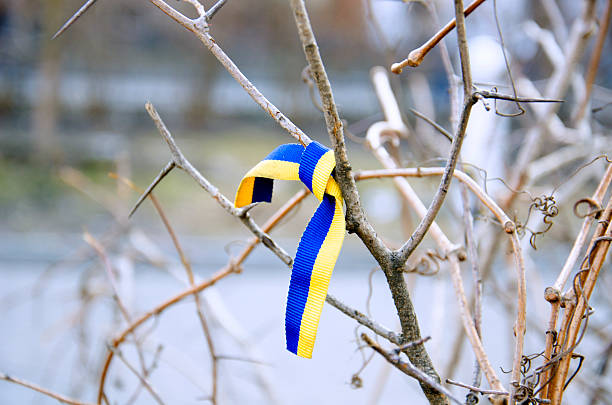
Obozrevatel
In general, the current governance model can be understood as an occupying kleptocratic regime. As can be seen from the visits of delegations from the Kremlin and the occupied Crimea, they are assessing the assets for their further removal. The priorities were vaguely voiced by Deputy Prime Minister of the Russian Federation, Husnullin, who visited the invaded territories: agricultural products, equipment of industrial enterprises, diesel fuel, fertilizers. In fact, the occupiers are building their clientelist networks through which they will distribute material goods and other preferences, as well as guarantee security. Today, any available services are provided solely as a loyalty fee. For example, in order to receive compensation from the occupation administrations for the destroyed property, you need to accuse Ukrainian soldiers of this.
Illegal Authorities of Crimea Want Another Marriage of Convenience
The illegal government of Crimea became the driver of aggressive rhetoric against Ukraine and a key tool for the implementation of Russian plans to establish long-term control over the territories of Kherson and Zaporizhia regions. Leaders of the illegal authorities in Crimea not only comment on the course of seizure of the territories of Kherson and Zaporizhzhya regions, but also make statements about Russia's war against Ukraine. Chairman of the "state" council of Crimea, Volodymyr Konstantynov, said: "The goals of the special operation will never be fully recognized and justified if Ukraine remains as a state."
The so-called speaker also called for "sweeping" the territories of Western Ukrainian regions and bringing Russian missile launchers to the borders with Poland. As for the territories of Donetsk and Luhansk Oblasts, representatives of the Crimean occupation administration publicly advise the LPR/DPR on how to establish their power in newly captured communities. The so-called head of the Crimea, Serhii Aksionov, who was a marginal politician before the occupation, threatened to shoot Ukrainian servicemen leaving from Azovstal. As to the prisoners who will not be executed by the verdict of the tribunal, Aksionov suggested sending them to the hard labour of restoring the cities of Donbas.
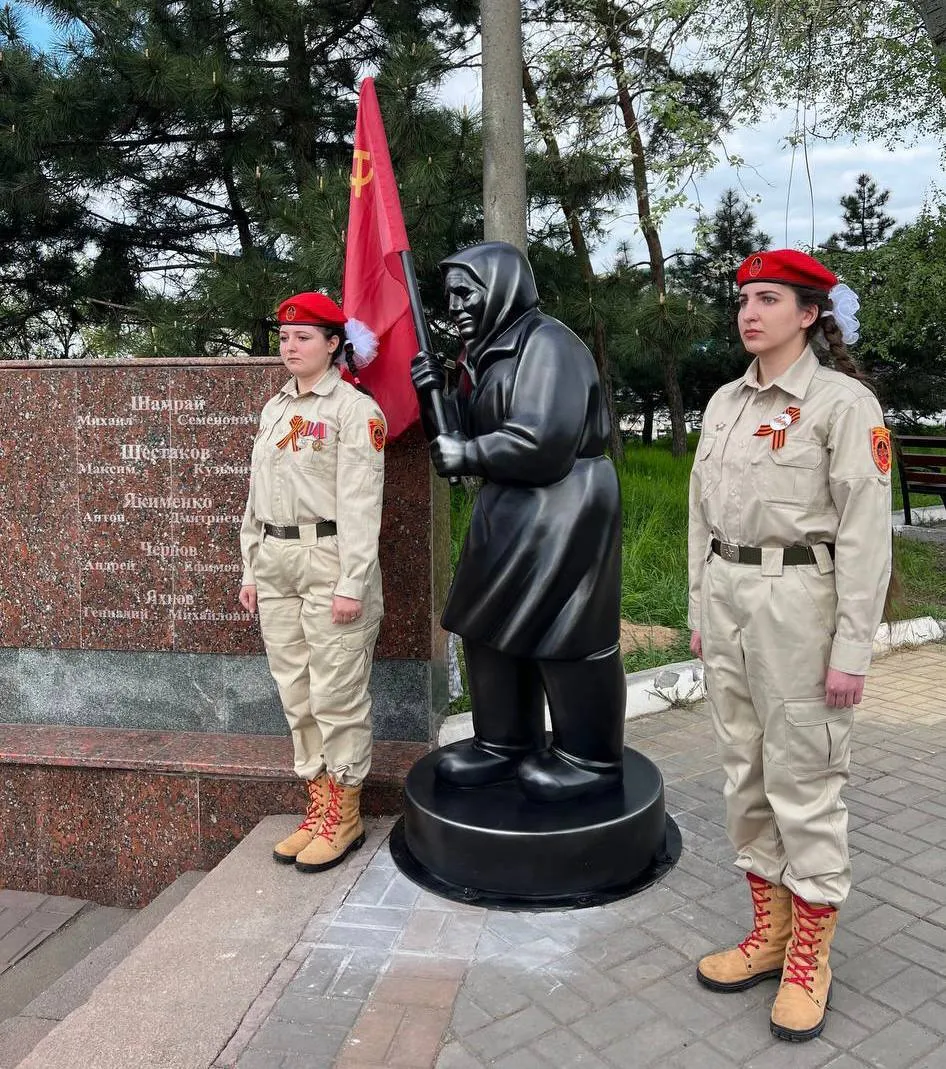
Mariupol, May 2022. A new ideology. Obozrtevatel
There is a simple rationale behind this ideological rhetoric. In the Russian political terrarium, there is an increasingly fierce struggle for the right to become the tacit master of the newly seized lands or to be involved in the large-scale schemes of plundering the territories. Taking advantage of its location, the occupation authorities of Crimea are ready to compete for this "honorary" role like no other.
Crimean officials claim agricultural products from Kherson and Melitopol and are already organizing showcase fairs. They also do not mind "seizing" industrial enterprises of the region, where Serhii Aksionov has already visited Kherson. The occupiers plan to earn on the residents of these territories by supplying gasoline and other goods, and by opening retail chains. Aksionov and Konstantinov promise golden mountains and marvels to Crimean residents thanks to stealing Ukrainian water from the North Crimean Canal. They explain that with water it would be possible to resume agricultural activities and the work of the Titan plant. "Plant owners" said that they were already clearing the channel between the enterprise's reservoir and the North Crimean Canal.
In addition to the trivial enrichment, there is, of course, a political motive — the traditional Russian desire to remain in power forever. In particular, Aksionov has long been confidently moving towards this goal. Earlier, at the meeting of the "State Council" of Crimea, amendments were made to the "Constitution of the Republic of Crimea" which lifted restrictions on the replacement of the position of a senior official of the RF subject by one person for no more than two consecutive terms. Now, Aksionov may hold office for an unlimited number of terms. Likewise, the powers of Aksionov on the dismissal of "heads" of municipalities have been strengthened. For all these granted privileges, he now needs to shine at work.
Occupied Territories of Donetsk and Luhansk Oblasts: Dancing on the Ruins
Aware of the precariousness of their situation, the illegal authorities in Donetsk and Luhansk Oblasts are trying to offer an acceptable vision for the development of the newly occupied territories. Demonstrating the cynicism of his own fantasy, Pushilin sees the destroyed and executed Mariupol as a recreational zone: "The plan is to develop a city as a resort area. This is the desire of the population.” At the same time, the authorities do not abandon plans for the restoration of industrial enterprises. "Everything that "survived" is planned to be restored," said the former head of the local MMM. Under the disguise of the purported interests of local residents, Pushilin managed to announce plans to demolish Azovstal. In other words, to "free" people from salaries and jobs. Instead, representatives of the government of the Chechen Republic visited Mariupol, and officials of the legal city council immediately announced the intention of the Kadyrov team to take control of the port and other surviving objects in the city burned by the Russians. "The Mariupol authorities are going to use the experience of Chechnya," Ramzan Kadyrov commented on the visit of subordinates to Mariupol.
The repressive machinery of unrecognized entities continues to implement the plan for the forced mobilization of conscripts. All this is so bad that the initiators have to show their willingness to mitigate the conditions for conscription and mobilization, offering the extended postponement (for students). According to media reports, protests against illegal mobilization by LPR/DPR terrorist groups took place in Luhansk.
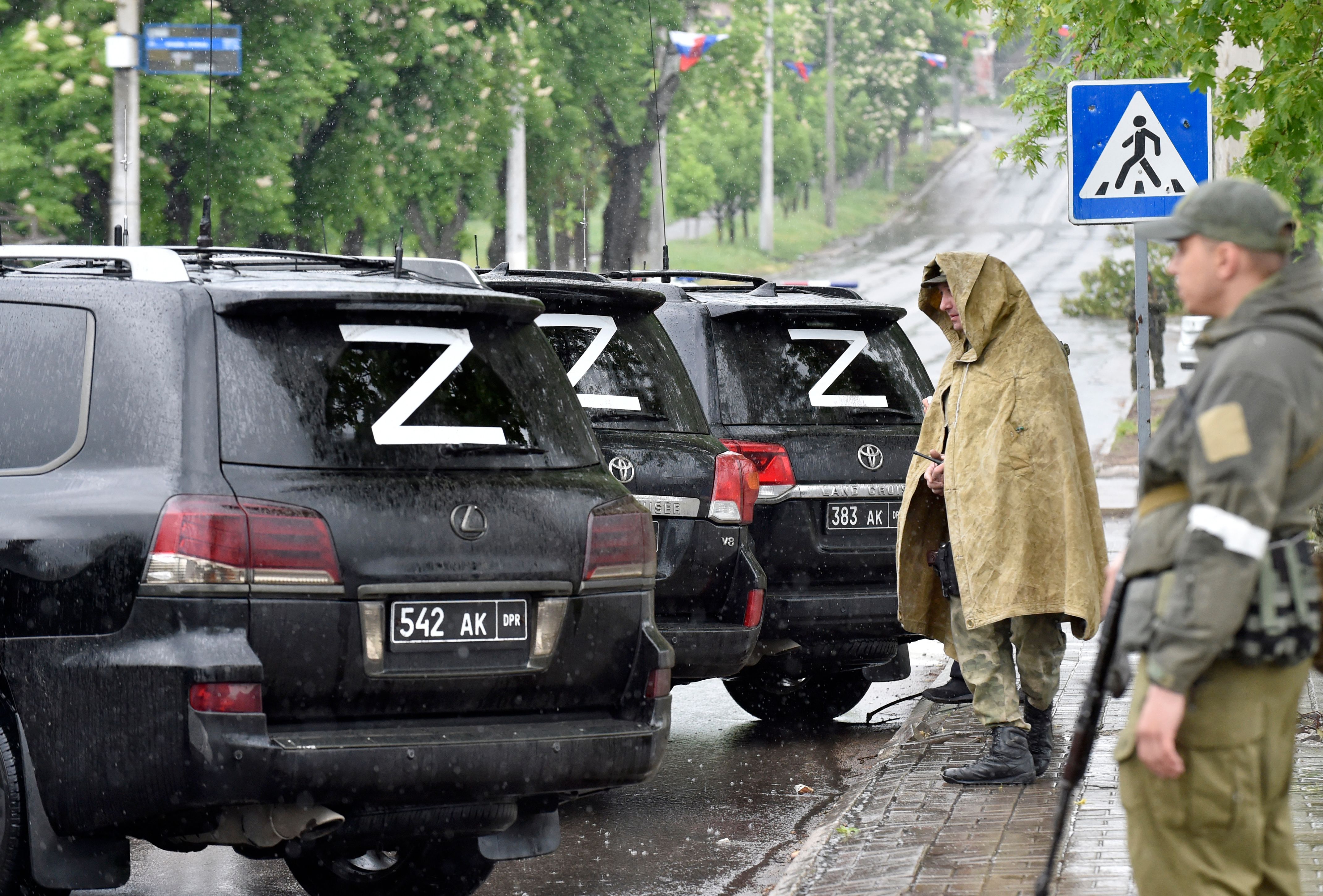
May 18, 2022. On May 18, 2022, Mariupol, the leader of the self-proclaimed separatist group, came for the prey. Getty Images
Despite the formal recognition of "republics", the Kremlin does not offer easy ways to integrate them. Last week, the occupation administrations of Donetsk and Luhansk said that residents of the temporarily occupied territories can withdraw money from bank cards issued in Russia. However, this can only be done through the International Settlement Bank from South Ossetia. Therefore, for proxy republics, the option of permanent reunification with Russia remains available only through the same "bogus republics."
Also, representatives of the occupation authorities are trying to strengthen the integration of "educational" institutions of Donetsk and Luhansk with Russian universities. The Ministry of Education of the Russian Federation has approved a list of higher education institutions that should support the LPR/DPR on a permanent basis. Talented young people are promised a "double" diploma. There is no irony in the fact that for a region that once was one of the educational centers of Ukraine, the scientific and educational process will be organized by academic propaganda institutions.
After Putin's "recognition" of the "LPR/DPR", the so-called republics have tried to demonstrate their agency and openness to the world. Against the background of the complete isolation of the Kremlin authorities, the temporarily occupied Donbass is establishing diplomatic relations with North Korea. Anecdotically enough but the "foreign ministers" of the "LPR/DPR" held an official meeting with the DPRK ambassador to Russia.
Meanwhile, the LDPR leader, member of the negotiation group, a councilor Leonid Slutski visited the occupied territories. In Donetsk, he proposed to "install an object" in honor of Vladimir Zhirinovskiy. The Russian MP also implied a possibility of holding a referendum in Donetsk and Luhansk regarding their future. Since new guidelines have not yet been distributed, he referred to the traditional scheme: "As it was in Crimea and Sevastopol".
For more information about what residents in the temporarily occupied territories of Ukraine live by, what problems they face and what Russia as an occupying state invented to maintain control in these regions, see the weekly online discussions "The Occupied".
COVER PHOTO: Mariupol, April 2022 © Getty Images
Oleksandr Neberykut, Oleksandr Kliuzhev — specially for zn.ua
